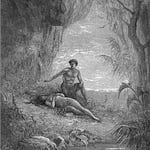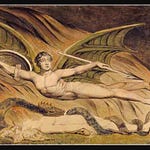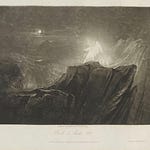Hello and welcome to Episode 64 of Read Paradise Lost with me, Jane Davis, a podcast and Substack newsletter about my project to read all of Paradise Lost by John Milton, aloud, and with a sometimes word-by-word, sometimes line-by-line discussion. This is a one-take recording with no editing, so forgive noise of seagulls, my coughing, or sound of men drilling next door. Rough and ready reading is what you get.
See Episode 1 for an introduction to the project.
A longish, 100 line, section today, and I’m going to read it all through, to give you a sense of the run of the verse, before going back to comment on a few parts. Do put questions in the comments if you think I’ve skipped something you needed to know. The portion we’ll look at falls into two movements - first Raphael’s flight through the universe, and second the preparations for his coming made by Adam and Eve.
We begin in book 5, line 257, as Raphael sets out towards Paradise from Heaven’s Gate;
From hence, no cloud, or, to obstruct his sight,
Starr interpos'd, however small he sees,
Not unconform to other shining Globes,
Earth and the Gard'n of God, with Cedars crownd [ 260 ]
Above all Hills. As when by night the Glass
Of Galileo, less assur'd, observes
Imagind Lands and Regions in the Moon:
Or Pilot from amidst the Cyclades
Delos or Samos first appeering kenns [ 265 ]
A cloudy spot. Down thither prone in flight
He speeds, and through the vast Ethereal Skie
Sailes between worlds and worlds, with steddie wing
Now on the polar windes, then with quick Fann
Winnows the buxom Air; till within soare [ 270 ]
Of Towring Eagles, to all the Fowles he seems
A Phœnix, gaz'd by all, as that sole Bird
When to enshrine his reliques in the Sun's
Bright Temple, to Ægyptian Theb's he flies.
At once on th' Eastern cliff of Paradise [ 275 ]
He lights, and to his proper shape returns
A Seraph wingd; six wings he wore, to shade
His lineaments Divine; the pair that clad
Each shoulder broad, came mantling o're his brest
With regal Ornament; the middle pair [ 280 ]
Girt like a Starrie Zone his waste, and round
Skirted his loines and thighes with downie Gold
And colours dipt in Heav'n; the third his feet
Shaddowd from either heele with featherd maile
Skie-tinctur'd grain. Like Maia's son he stood, [ 285 ]
And shook his Plumes, that Heav'nly fragrance filld
The circuit wide. Strait knew him all the Bands
Of Angels under watch; and to his state,
And to his message high in honour rise;
For on Som message high they guessd him bound. [ 290 ]
Thir glittering Tents he passd, and now is come
Into the blissful field, through Groves of Myrrhe,
And flouring Odours, Cassia, Nard, and Balme;
A Wilderness of sweets; for Nature here
Wantond as in her prime, and plaid at will [ 295 ]
Her Virgin Fancies, pouring forth more sweet,
Wilde above Rule or Art; enormous bliss.
Him through the spicie Forrest onward com
Adam discernd, as in the dore he sat
Of his coole Bowre, while now the mounted Sun [ 300 ]
Shot down direct his fervid Raies, to warme
Earths inmost womb, more warmth then Adam needs;
And Eve within, due at her hour prepar'd
For dinner savourie fruits, of taste to please
True appetite, and not disrelish thirst [ 305 ]
Of nectarous draughts between, from milkie stream,
Berrie or Grape: to whom thus Adam call'd.
Haste hither Eve, and worth thy sight behold
Eastward among those Trees, what glorious shape
Comes this way moving; seems another Morn [ 310 ]
Ris'n on mid-noon; Som great behest from Heav'n
To us perhaps he brings, and will voutsafe
This day to be our Guest. But goe with speed,
And what thy stores contain, bring forth and poure
Abundance, fit to honour and receive [ 315 ]
Our Heav'nly stranger; well we may afford
Our givers thir own gifts, and large bestow
From large bestowd, where Nature multiplies
Her fertil growth, and by disburd'ning grows
More fruitful, which instructs us not to spare. [ 320 ]
To whom thus Eve. Adam, earths hallowd mould,
Of God inspir'd, small store will serve, where store,
All seasons, ripe for use hangs on the stalk;
Save what by frugal storing firmness gains
To nourish, and superfluous moist consumes: [ 325 ]
But I will haste and from each bough and break,
Each Plant and juiciest Gourd will pluck such choice
To entertain our Angel guest, as hee
Beholding shall confess that here on Earth
God hath dispenst his bounties as in Heav'n. [ 330 ]
So saying, with dispatchful looks in haste
She turns, on hospitable thoughts intent
What choice to chuse for delicacie best,
What order, so contriv'd as not to mix
Tastes, not well joynd, inelegant, but bring [ 335 ]
Taste after taste upheld with kindliest change,
Bestirs her then, and from each tender stalk
Whatever Earth all-bearing Mother yields
In India East or West, or middle shoare
In Pontus or the Punic Coast, or where [ 340 ]
Alcinous reign'd, fruit of all kindes, in coate,
Rough, or smooth rin'd, or bearded husk, or shell
She gathers, Tribute large, and on the board
Heaps with unsparing hand; for drink the Grape
She crushes, inoffensive moust, and meathes [ 345 ]
From many a berrie, and from sweet kernels prest
She tempers dulcet creams, nor these to hold
Wants her fit vessels pure, then strews the ground
With Rose and Odours from the shrub unfum'd.
Mean while our Primitive great Sire, to meet [ 350 ]
His god-like Guest, walks forth, without more train
Accompanied then with his own compleat
Perfections; in himself was all his state,
More solemn then the tedious pomp that waits
On Princes, when thir rich Retinue long [ 355 ]
Of Horses led, and Grooms besmeard with Gold
Dazles the croud, and sets them all agape.
There. Lovely.
The first sentence has what might seem a clunky syntax;
From hence, no cloud, or, to obstruct his sight,
Starr interpos'd, however small he sees,
Not unconform to other shining Globes,
Earth and the Gard'n of God, with Cedars crownd [ 260 ]
Above all Hills.
But the point is clear - everything in Paradise, though tiny and far-off, can be seen. We have some earthly, human parallels, writes Milton, allowing himself to remember one of his most extraordinary meetings;
As when by night the Glass
Of Galileo, less assur'd, observes
Imagind Lands and Regions in the Moon:
Or Pilot from amidst the Cyclades
Delos or Samos first appeering kenns [ 265 ]
A cloudy spot.
Milton, writing in Areopagitica ( 1644, Milton’s defence of freedom of speech) tells that while visiting Italy, he sought out Galileo. Like other readers of Milton (see Joe Moshenko’s book, Making Darkness Light, Chapter 7) I have always found this to be a most extraordinary possibility. Milton and Galileo occupy different parts of my mental time-culture-map, and yet they met. And on purpose, Milton sought out this scientific revolutionary. He is the only one of Milton’s contemporaries named in the poem. But all this is an aside. The point is - humans have known great long-sightedness and vision not unlike Raphael’s. And yet nothing like - for look at these distances!
Down thither prone in flight
He speeds, and through the vast Ethereal Skie
Sailes between worlds and worlds, with steddie wing
Now on the polar windes, then with quick Fann
Winnows the buxom Air; till within soare [ 270 ]
Of Towring Eagles, to all the Fowles he seems
A Phœnix, gaz'd by all, as that sole Bird
When to enshrine his reliques in the Sun's
Bright Temple, to Ægyptian Theb's he flies.
At once on th' Eastern cliff of Paradise [ 275 ]
He lights, and to his proper shape returns
A Seraph wingd;
A reader pointed out to me the presence of the Phoenix. In my Fowler edition, the note to this says, ‘In Christian symbolism the bird was an emblem of the triumph of eternal life over death, as well as of regeneration…Proverbially, ‘a faithful friend is like a phoenix’. Thus Raphael resembles the phoenix in that he is a friend of man.’) But now as he lands in Paradise and takes his proper shape, we see in minute close-up,his angelic wings;
six wings he wore, to shade
His lineaments Divine; the pair that clad
Each shoulder broad, came mantling o're his brest
With regal Ornament; the middle pair [ 280 ]
Girt like a Starrie Zone his waste, and round
Skirted his loines and thighes with downie Gold
And colours dipt in Heav'n; the third his feet
Shaddowd from either heele with featherd maile
Skie-tinctur'd grain. Like Maia's son he stood, [ 285 ]
And shook his Plumes, that Heav'nly fragrance filld
The circuit wide. Strait knew him all the Bands
Of Angels under watch; and to his state,
And to his message high in honour rise;
For on Som message high they guessd him bound. [ 290 ]
Milton’s astonishing imagination (and Biblical frame of reference, see Isiah, Ezekial) produces poetic description that had readers in the online Shared Reading group exclaiming. ‘Colours dipt in Heaven… skie tinctutur’d’.
Raphael passes the glittering tents of Gabriel’s army.
Thir glittering Tents he passd, and now is come
Into the blissful field, through Groves of Myrrhe,
And flouring Odours, Cassia, Nard, and Balme;
A Wilderness of sweets; for Nature here
Wantond as in her prime, and plaid at will [ 295 ]
Her Virgin Fancies, pouring forth more sweet,
Wilde above Rule or Art; enormous bliss.
Him through the spicie Forrest onward com
Adam discernd, as in the dore he sat
Of his coole Bowre, while now the mounted Sun [ 300 ]
Shot down direct his fervid Raies, to warme
Earths inmost womb, more warmth then Adam needs;
And Eve within, due at her hour prepar'd
For dinner savourie fruits, of taste to please
True appetite, and not disrelish thirst [ 305 ]
Of nectarous draughts between, from milkie stream,
Berrie or Grape: to whom thus Adam call'd.
The odours and spices are exotic, perhaps also biblical - Nard is the ointment poured over Jesus ‘to annoint him to the burying’ -and ‘spicie Forrest’ is marvellous, as if the whole of Paradise was infused by beautiful, natural scent - and in this is rather like the Heavenly creatures - Raphael emitting a magnificent scent as he shakes his wings, God fills Heaven with ‘ambrosial fragrance’ as he speaks (Book 3, line 135).
Adam spies Raphael approaching as he sits in the shade of his door, Earth’s warmth being ‘more warmth than Adam needs’ while Eve prepares their food. Adam calls to her;
Haste hither Eve, and worth thy sight behold
Eastward among those Trees, what glorious shape
Comes this way moving; seems another Morn [ 310 ]
Ris'n on mid-noon; Som great behest from Heav'n
To us perhaps he brings, and will voutsafe
This day to be our Guest. But goe with speed,
And what thy stores contain, bring forth and poure
Abundance, fit to honour and receive [ 315 ]
Our Heav'nly stranger; well we may afford
Our givers thir own gifts, and large bestow
From large bestowd, where Nature multiplies
Her fertil growth, and by disburd'ning grows
More fruitful, which instructs us not to spare. [ 320 ]
Again we see adam secure, confident. This great presence approaches and Adam happily thinks ‘some great behest from Heav’n/To us perhaps he brings.’ I had to look up the word ‘behest’ - it is a command, or unignorable request. Adam’s entertainment of Raphael, says Fowler’s note, is ‘throughout modelled on Abraham’s entertainment of three angels in Genesis 18.’ Adam asks his woman to prepare a generous repast - not quite like the Abrahamic story, for there, Abraham also prepares the food;
And Abraham hastened into the tent unto Sarah, and said, Make ready quickly three measures of fine meal, knead it, and make cakes upon the hearth.
And Abraham ran unto the herd, and fetcht a calf tender and good, and gave it unto a young man; and he hasted to dress it.
And he took butter, and milk, and the calf which he had dressed, and set it before them; and he stood by them under the tree, and they did eat.
Eve’s reply is a slight housewifely corrective; there is no need to store food when so much is always available;
To whom thus Eve. Adam, earths hallowd mould,
Of God inspir'd, small store will serve, where store,
All seasons, ripe for use hangs on the stalk;
Save what by frugal storing firmness gains
To nourish, and superfluous moist consumes: [ 325 ]
But I will haste and from each bough and break,
Each Plant and juiciest Gourd will pluck such choice
To entertain our Angel guest, as hee
Beholding shall confess that here on Earth
God hath dispenst his bounties as in Heav'n. [ 330 ]
However, no need to harp on it, she says. I’ll get some food. And so the first lunch-party is prepared;
So saying, with dispatchful looks in haste
She turns, on hospitable thoughts intent
What choice to chuse for delicacie best,
What order, so contriv'd as not to mix
Tastes, not well joynd, inelegant, but bring [ 335 ]
Taste after taste upheld with kindliest change,
Bestirs her then, and from each tender stalk
Whatever Earth all-bearing Mother yields
In India East or West, or middle shoare
In Pontus or the Punic Coast, or where [ 340 ]
Alcinous reign'd, fruit of all kindes, in coate,
Rough, or smooth rin'd, or bearded husk, or shell
She gathers, Tribute large, and on the board
Heaps with unsparing hand; for drink the Grape
She crushes,
Milton has clearly had some experience of fine cooking! Perhaps on his long trip to Italy…
contriv'd as not to mix
Tastes, not well joynd, inelegant, but bring [ 335 ]
Taste after taste upheld with kindliest change,
From many a berrie, and from sweet kernels prest
She tempers dulcet creams, nor these to hold
Wants her fit vessels pure, then strews the ground
With Rose and Odours from the shrub unfum'd.
From what would later seem all corners of the Earth Eve chooses the finest fruits, and makes delicious drinks, too.
the Grape
She crushes, inoffensive moust, and meathes [ 345 ]
From many a berrie, and from sweet kernels prest
She tempers dulcet creams, nor these to hold
Wants her fit vessels pure, then strews the ground
With Rose and Odours from the shrub unfum'd.
And Adam, like Abraham, leaves the shade and strolls forth to meet the guest for whom all this has been prepared.
Mean while our Primitive great Sire, to meet [ 350 ]
His god-like Guest, walks forth, without more train
Accompanied then with his own compleat
Perfections; in himself was all his state,
More solemn then the tedious pomp that waits
On Princes, when thir rich Retinue long [ 355 ]
Of Horses led, and Grooms besmeard with Gold
Dazles the croud, and sets them all agape.
In the midst of all this gorgeousness, Milton - characteristically I’m sorry to say - cannot resist a bit of sniping at royalty. Adam is made magnificent by his own ‘compleat/perfections.’ Unlike royalty and their retinues, ‘besmear’d with gold.’
Yes, corruption will come. But meanwhile, like the crowd witnessing the royal retinue, we are dazzled, by Milton’s poetry, by his astonishingly real painting of the scene and all of its components. This is one of the many parts of the poem where poetry excites and moves us, unlike those dense and difficult parts where Milton’s theology has us (well, me) struggling and sometimes stumped. The poetry is fabulous, yes. But I also read to experience the stumped feeling. I want not just to see these magnificent pictures but also to know - as far as I can - what Milton was thinking.
‘Sad task and hard’ as Milton says elsewhere in the poem.
More next week.














Share this post